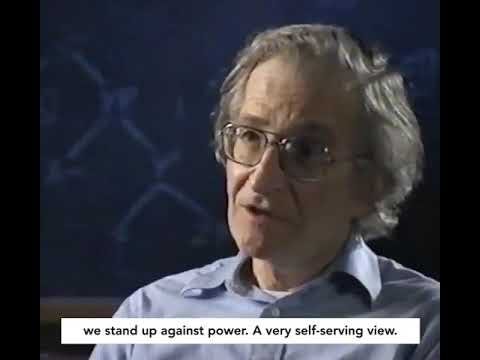No one says ‘Trust the Journalism’. Our society is lucid to the reality that journalism is fallible. Journalism is something we engage with every day, so we have an instinct for how it’s produced. A billionaire can buy the newspaper and start to make the hiring process political. Such practises are common. The ‘right’ people get the job. The ‘best’ people get the right opportunities put in front of them. Those with serious concerns keep quiet for fear of being squeezed out.
Noam Chomsky, for all his recent failings, beautifully explained this back in the early 90s. His work changed my perspective forever. Throughout my time inside journalism, I could see the very thing he described: Chomsky called it ‘the political economy of the media.’
A very succinct ‘moment’ which illuminates this effect happened in 1996 when Chomsky was talking to a very young Andrew Marr. “How can you know I am self-censoring?” asked an indignant Andrew Marr. Chomsky replied perfectly, “I’m not saying you’re self-censoring. I’m sure you believe everything you’re saying…. What I’m saying is, that if you believed something different, you wouldn’t be sitting where you’re sitting.”
Those who internalise the ‘correct’ values flow effortlessly into prominent positions, and because they naturally have those values, there is no need to self-censor. What they say, and this bit is crucial, what they want to say, naturally aligns with the media’s ‘political economy.’ Media naturally selects those who uphold their values. Naturally, Andrew Marr went on to have a 30-year political career at the BBC.
Like journalism, science is not immune from the institutions that produce it. It too has a political economy, or perhaps we could better describe it as a corporate economy. There are external forces that shape the scientific process in their interest. Do you need funding? ‘They’ control the supply. You want to research preventing illness but there’s more money in treating symptoms…
‘Science’ attracts special interest groups the same way fishing trawlers attract seagulls. The outcomes of scientific studies create incredible profit opportunities, and there are a great many ways to move the needle in your favour. Many millennials now have an instinct for these issues in journalism, but for whatever reason, they don’t yet have the same instinct for these issues in the world of science.
‘Trust in Science’ is becoming a mantra in the rebirth of a faith-based identity. The truth, at least in the world of medical science, is that the influence of special interests corrupting the process is even worse than the problems we’re dealing with in journalism. Our information ecosystem has been drained of finances, but in medical science, special interests have flooded the space with cash. Literally, billions of dollars are spent to control the entire process, from researching the drug to prescribing it. ‘The industry affects every level of healthcare provision’, these are not conspiratorial fantasies, but the conclusions of the UK Government.
So where are we? The scientific method works - of course it does - but you’re not engaging with ‘the scientific method’ when reading headlines distributed through a dysfunctional journalism industry. It’s very possible you’re engaging with the PR department of a massive pharmaceutical lobby. It’s very possible that ‘when there is greater financial interest’, even the findings inside a prestigious journal are totally wrong. We know we have a crisis in journalism, and that crisis is compounding the same issue in scientific research. I believe independent journalism is part of the antidote we need.
Over the next few weeks, I’m going to show you the nuts and bolts of how this actually works. I’m going to show you stories and studies written by the lobby. I’ll need to put some of these stories behind a paywall. I don’t want to do that, because the thing that motivates me is getting this stuff out there, but I cannot afford to be idealistic. I cannot do this work without your help. If you’ll support me with a subscription, and by promoting The Digger to new readers, I’ll be able to illuminate these issues for everyone. Together, we can push back.
Phil






Ivermectin Hoax motivation: "You want to research preventing illness but there’s more money in treating symptoms…" translates to: "You want to treat illness early but there’s more money in not doing this." - As always: Follow the money! 💰